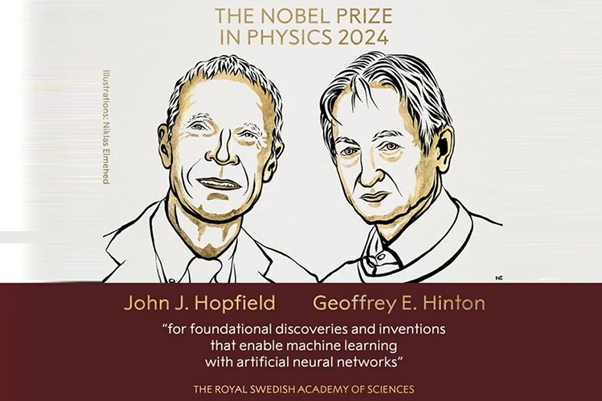Introduction
The Nobel Prize in Physics 2024 has been awarded jointly to John J. Hopfield and Geoffrey E. Hinton for their groundbreaking contributions to the field of machine learning, particularly through the development of artificial neural networks. This recognition highlights the pivotal role that these technologies play in advancing scientific research and practical applications across various domains, including artificial intelligence (AI), data analysis, and computational neuroscience.
Background of the Laureates

John J. Hopfield
-
- Birth and Education: Born in 1933 in the United States, John J. Hopfield received his PhD from the California Institute of Technology (Caltech) in 1958.
- Career Highlights: Hopfield is best known for formulating the Hopfield Network, a form of recurrent artificial neural network that serves as a model for associative memory. His work laid the foundation for understanding how neural networks can be used to solve complex optimization problems.
Geoffrey E. Hinton
-
- Birth and Education: Born in 1947 in London, UK, Geoffrey Hinton completed his PhD at the University of Edinburgh in 1978.
- Career Highlights: Often referred to as one of the “godfathers” of deep learning, Hinton has made significant contributions to neural network research. His work on backpropagation algorithms and deep learning architectures has revolutionized AI, enabling machines to learn from vast amounts of data.
Contributions to Physics and Technology
Foundational Discoveries
The award recognizes Hopfield and Hinton’s foundational discoveries that have enabled machine learning through artificial neural networks. Their work has transformed how machines process information, learn from data, and make decisions, paralleling processes observed in biological systems.
1. Hopfield Networks: Introduced by John J. Hopfield in 1982, these networks are designed to mimic the associative memory of biological systems. They can store patterns and retrieve them based on partial inputs, making them useful for solving optimization problems and pattern recognition tasks.
2. Deep Learning Frameworks: Geoffrey Hinton’s research on deep learning has led to significant advancements in various applications such as image recognition, natural language processing, and speech recognition. His development of convolutional neural networks (CNNs) has been particularly influential in computer vision tasks.
Impact on Machine Learning
The contributions of Hopfield and Hinton have had profound implications for both theoretical research and practical applications:
-
- Advancements in AI: Their work has propelled AI into mainstream technology, enabling applications ranging from self-driving cars to medical diagnostics.
- Interdisciplinary Influence: The principles derived from their research have influenced fields such as neuroscience, psychology, and cognitive science by providing insights into how learning occurs in both machines and biological organisms.
Implications for Future Research
The recognition of Hopfield and Hinton underscores the importance of continued research in machine learning and artificial intelligence:
1. Ethical Considerations: As AI technologies become more integrated into society, ethical considerations regarding their use must be addressed, including issues related to bias, privacy, and accountability.
2. Interdisciplinary Collaboration: Future advancements will likely require collaboration across disciplines—combining insights from physics, computer science, neuroscience, and ethics—to develop robust AI systems that benefit society.
3. Investment in Education: Encouraging education and training in machine learning will be crucial for preparing future generations to harness these technologies responsibly.
Way Forward
As we move forward into an era increasingly defined by artificial intelligence, it is essential to consider the implications of these technologies on society while fostering responsible research practices that prioritize ethical considerations. The achievements of Hopfield and Hinton serve as a reminder of the power of scientific inquiry to drive progress and innovation in an ever-evolving world.
Conclusion
The Nobel Prize in Physics 2024 awarded to John J. Hopfield and Geoffrey E. Hinton marks a significant milestone in recognizing the impact of machine learning on contemporary science and technology. Their pioneering work has not only transformed our understanding of artificial neural networks but also paved the way for innovations that continue to shape various sectors worldwide.
Spread the Word



